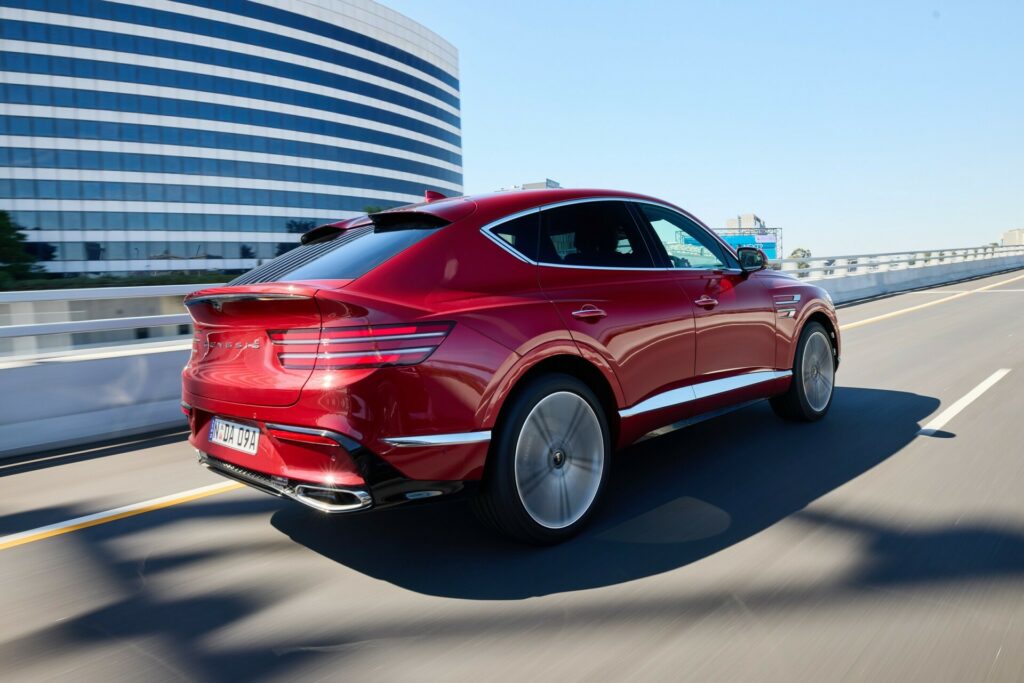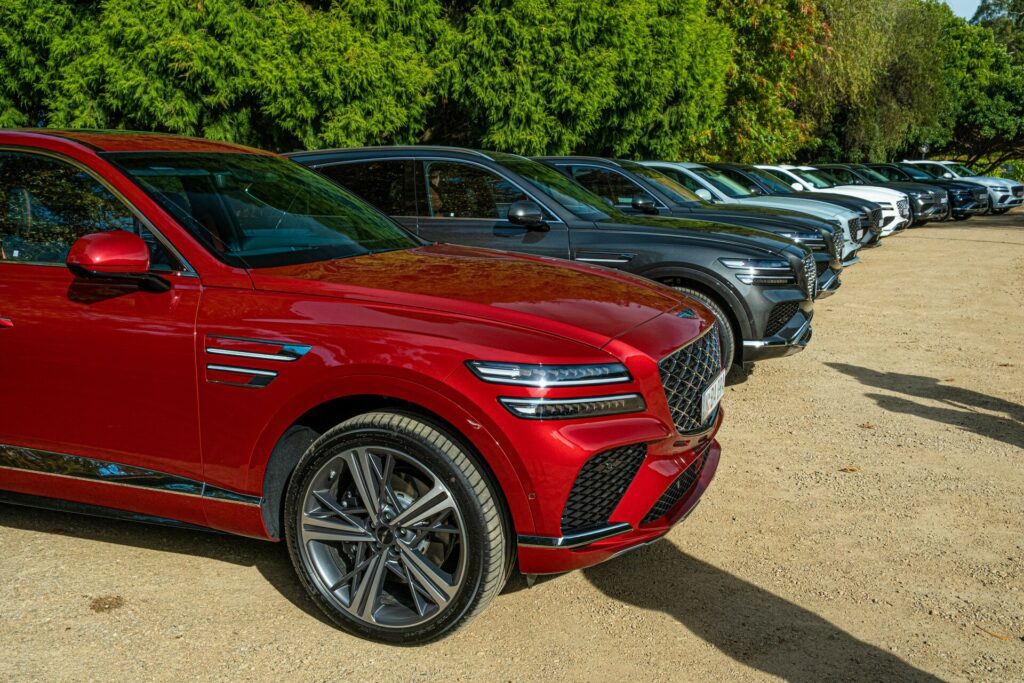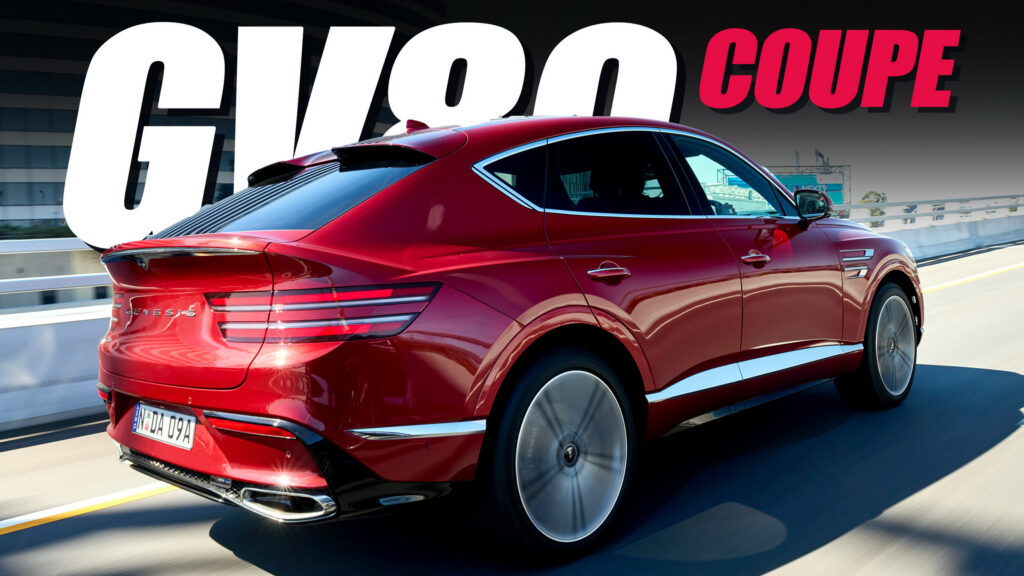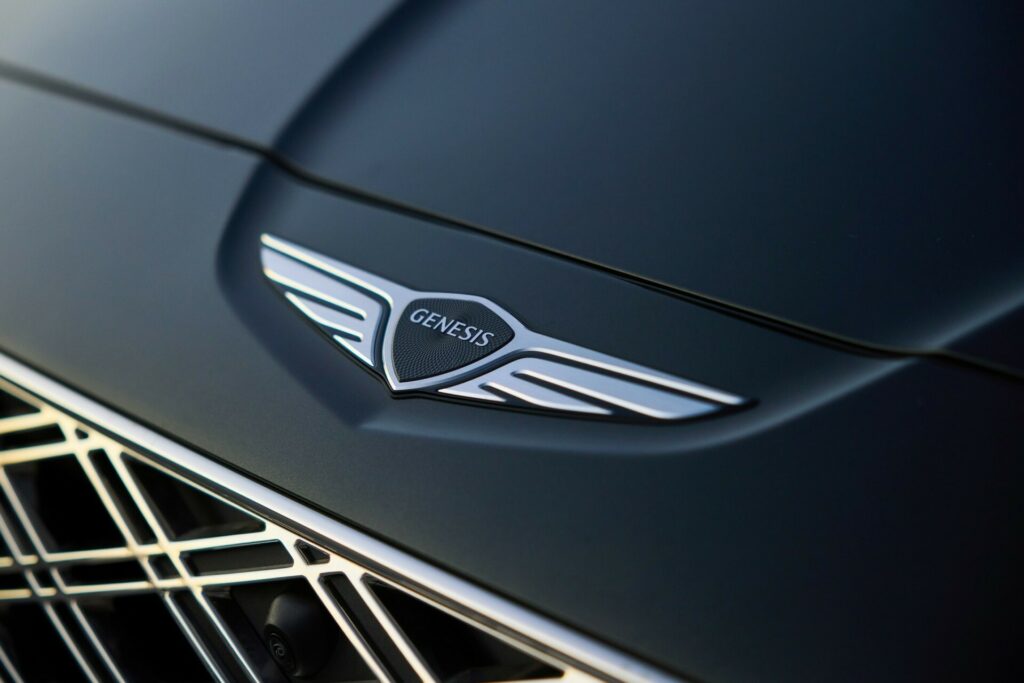It has been eight and a half years since Hyundai established Genesis as an independent marque.
In this time, the company has launched some hugely impressive vehicles. These include the G70 sports sedan that wowed the automotive press during its launch in 2018, so much so that it was named North American Car of the Year in 2019. It has plenty of other solid options, too.
Read: How Does The Genesis GV60 Compare To A High-Spec Hyundai Ioniq 5?
For example, there are the G80 and G90 luxury sedans, the quirky battery-electric GV60, and the brand’s best-selling model, the GV70. Then there’s the GV80, the latest Genesis that we tested. This model has been on sale since 2020 and recently received its first mid-life facelift, bringing several exterior and interior changes. This time around, there is also a new GV80 Coupe that follows in the path of the BMW X6 and Mercedes-Benz GLE Coupe.
Is the marque’s updated rival to the BMW X5 and Mercedes-Benz GLE as impressive as the firm’s other offerings? We recently drove over 2,000 km (~1,200 miles) in a handful of different GV80 and GV80 Coupe SUVs to find out.
Brad Anderson/Carscoops
Quick facts
Genesis has been operating as an independent brand in Australia since 2017 and in that time, has shifted just a touch over 4,000 vehicles. That’s not a lot and shows how challenging it has been to crack into the local market, despite how well-rounded its models are. The GV80 sits at the top of the local lineup.
Three versions of the GV80 are sold locally. These consist of six- and seven-seat versions of the standard SUV and the new GV80 Coupe sold as a five-seater. Interestingly, all versions come with the Hyundai Motor Group’s 3.5-liter twin-turbocharged T-GDi V8 as standard.
The engine delivers an impressive 279 kW (374 hp) and 530 Nm (391 lb-ft) of torque and is coupled to an eight-speed automatic transmission with power sent through a rear-wheel drive-biased all-wheel drive system.

Prior to the 2025 update, Genesis Australia had offered the GV80 with a 3.0-liter turbodiesel and a 2.5-liter turbocharged four-cylinder in addition to the flagship V6. While the diesel had accounted for 33% of sales and the 2.5-liter made up 24% of all GV80s sold, both engines have been ditched for 2025. Genesis says this is because the V6 better suits the character of a big, luxurious SUV like this and believes the GV80 Coupe can make up for the lost sales of these two engines.
The lack of these two engines also means the GV80 is much more expensive than before. Whereas the old 2.5-liter model had been available from AU$92,000 (~$60,200) before on-road costs, the cheapest seven-seat version now goes for AU$130,000 (~$85,000). This price rises to AU$133,000 (~$87,000) for the six-seater and AU$136,000 (~$89,000) for the Coupe. All versions now come standard with a Luxury Pack that was previously an option but an equivalent 2025 GV80 still costs 8% more than last year’s model.
Brad Anderson/Carscoops
Exterior changes made to the 2025 model may not be immediately noticeable but they are there. For example, there is a new grille, a revised bumper with larger intakes, and new headlights with Micro-Lens Array technology. The presence of chrome garnish along the sides also adds to the premium feel of the SUV. Genesis has also revised the rear fascia and deleted the exhaust tips, opting for an exhaust that exits from beneath the vehicle.
As you’d imagine, the GV80 Coupe has a sportier roofline than the standard model. It also receives a more dynamic front end with larger air intakes, new front and rear bumpers, and dual exhaust tips.

Swimming in luxury
The more significant upgrades made for 2025 are found in the cabin. Gone are the separate instrument cluster and infotainment displays and in their place sits a 27-inch OLED display. There is also an 18-speaker Bang & Olufsen sound system, fingerprint recognition, a digital rear-view mirror, a new center console, and a three-spoke steering wheel that ditches the ugly two-spoke design of the old model.
A new storage compartment is also found below the HVAC screen. It includes a wireless smartphone charging pad and a UV light that can be turned on to eliminate surface bacteria on your phone.
Brad Anderson/Carscoops
Effortless performance
For the first half of our first day with the GV80, we drove the seven-seat SUV version from near Melbourne’s CBD down to the popular beachside town of Sorrento. During the journey, we had lengthy highway stints while also having the opportunity to drive along some more enjoyable twisties, perfect for testing out the big SUV’s dynamics.
Having never driven a GV80 before, I was immediately impressed with how smooth and quiet the big V6 is. I’ve driven plenty of Kia Stinger and Genesis G70s in the past with the older 3.3-liter twin-turbo V6 and thought the GV80’s newer and slightly more powerful engine would feel much the same. However, it doesn’t feel as feisty and is more refined, making it perfectly suited to a vehicle like this.
Read: 2025 Genesis GV80 And GV80 Coupe Bring Their Sleek Looks And 27-Inch Display Stateside
Genesis says the GV80 can hit 100 km/h (62 mph) in around 5.6 seconds. That’s a solid figure and one that we were able to match during our test. However, given that this is a vehicle weighing around 2.2 tonnes, it doesn’t feel particularly rapid off the line, not even with the Sport mode enabled. Instead, it provides a smooth and strong surge up to the legal speed limit, all with very little noise. There’s a synthetic engine note that can be pumped into the cabin but we opted against using it.
Genesis Australia
For munching motorway miles, the GV80 is the perfect companion. I spent more than 20 hours behind the wheel, including a 14-hour highway stint from Victoria to New South Wales and back, and never got tired. The seats provide excellent support and the massage function is a godsend. I was also particularly fond of the heated armrests in the center console but it’s a little frustrating they can only be enabled with the heated seats, meaning you can’t enable one without the other. There is even a perfume dispenser.
The 2025 GV80 is also the first Genesis model in Australia to launch with Hyundai’s Highway Driving Assist 2 function. It includes automatic lane changes, allowing you to simply toggle the indicator and the vehicle will move into the next lane. The lane-keeping and radar cruise control systems are also superb and I drove for hours on end along the highway without needing to make any throttle, brake, or steering inputs.
Brad Anderson/Carscoops
The only slight annoyance is the driver attention monitoring system was a little too intrusive for me and would start ringing a chime if I looked anywhere other than straight ahead for more than a couple of seconds. Fortunately, it can be easily disabled. It is also easy to disable the annoying speed limit alarm that rings every time you go 1 km/h over the posted speed limit.
Like the front seats, the second-row is also extremely comfortable and passengers sitting back there have several creature comforts too. These include heated and ventilated seats, a dedicated temperature control zone, and window shades that can be opened and closed at the touch of a button. The third row is tight and not suitable for adults. However, Genesis has been kind enough to install dedicated climate controls for the rear. It’s also nice that the second- and third-row seats can be folded up or down at the touch of a button.
Genesis Australia
GV80 Coupe
The 2025 Genesis GV80 Coupe is an all-new addition to the family and is positioned as a slightly sportier version of the standard model. But, Genesis has not made any mechanical modifications to it, meaning it feels identical to drive as the SUV. The most significant alterations it has made are the addition of a Sport+ driving mode and a new Flex Brake, which is a fancy way of saying you can tweak the sensitivity of the brake pedal.
Like the SUV, the GV80 Coupe performs brilliantly on the open road and is also a joy to operate at lower suburban speeds. Turn on Sport+ mode and fire it into a few corners and it handles its heft very well. However, I was not as confident about throwing it into sharp turns as I was in the Kia EV9 GT-Line I drove recently. Ultimately, the GV80 is not a vehicle that feels at home being driven at silly speeds. It is a vehicle that thrives in the mundane, whether that is stop-start traffic, city driving, or on the highway.
Brad Anderson/Carscoops
A downside of Genesis Australia’s decision to ditch the 3.0-liter diesel and 2.5-liter turbocharged four-cylinder is that the GV80’s standard V6 is quite thirsty. If you drive like a tool, it’ll slurp down over 14.0 l/100 km (16.8 U.S. mpg), much higher than the claimed 11.7 l/100 km (20.1 U.S. mpg) for the combined cycle. During two seven-hour stints with cruise control set at 110 km/h (~68 mph), the best we could average was 9.6 l/100 km (24.5 U.S. mpg). That’s not bad but the European brands sell their big SUVs with more efficient engines.
Verdict
The Genesis GV80 feels just as plush and premium as we’d hoped and is just as well-rounded as the marque’s other models. It offers extraordinary comfort, and refinement, and turns plenty of heads too. The price hike means it only just undercuts established European rivals like the base BMW X5 xDrive40i priced from AU$138,900 ($90,785) and the Mercedes-Benz GLE range that starts at AU$144,900 ($94,706). However, we remain unconvinced of the move to ditch the 3.0-liter diesel and 2.5-liter four-cylinder, particularly given that Mercedes and BMW sell the GLE and X5 with efficient diesel engines.



















































































































































































































